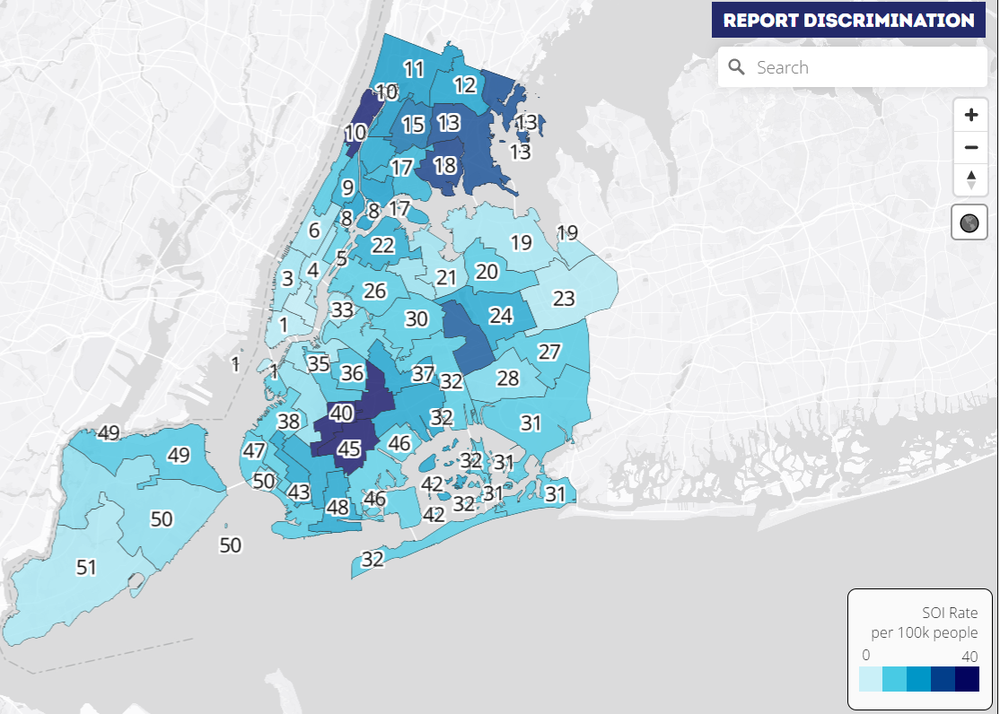New Yorkers in NYC’s poorest neighborhoods face higher housing discrimination, analysis finds
March 8, 2023, 3:14 p.m.
Housing discrimination map highlights reports of bias against renters with vouchers.

New Yorkers living in some of the city’s poorest neighborhoods are more likely to face discrimination if they’re receiving assistance to pay for rent, according to a new analysis by a pair of nonprofits.
Unlock NYC and Neighbors Together mapped roughly 1,500 reports of “source of income” discrimination complaints lodged against brokers and landlords since 2018. Both groups, which help people who have housing vouchers find homes, found that the highest rates of complaints occurred in northern Manhattan and central Brooklyn, along with parts of the northeast Bronx.
Manon Vergerio, the head of data and advocacy at UnlockNYC, said the map suggests renters using assistance programs like federal Section 8 or New York’s CityFHEPS are looking in areas they can afford with the subsidies — but still getting locked out.
“New York is so unbelievably unaffordable and a lot of areas are completely out of reach,” Vergerio said. “People are really limited in their options, and we feel people are going back to areas that are redlined” — a reference to historic, race-based housing policies that deepened segregation in cities like New York.
In neighborhoods like Washington Heights, Brownsville and Parkchester, rents are lower than the city’s soaring average and often priced for people with rental assistance vouchers. But brokers frequently put up roadblocks once they learn someone has a subsidy, Vergerio said.
“Vouchers are supposed to help people move to ‘high-opportunity’ zones, but the reality is that’s not what’s really happening because of the barriers in their search,” she said.
New Yorkers can qualify for a range of assistance programs based on their income, with the vouchers paying the bulk of their rent directly to landlords in most cases.
While source of income discrimination is illegal in New York City, it still accounts for the most common housing complaint submitted to the city’s Commission on Human Rights, according to annual reports.
After years of dwindling enforcement staff, Mayor Eric Adams pledged to bolster the commission’s source of income work in a recent speech, though his proposed budget would cut agency staff positions. The human rights commission did not respond to an email asking about its new enforcement efforts or current staffing.
UnlockNYC and Neighbors Together are urging the city to crack down on brokers and property owners who discriminate against people with housing vouchers. Much of the enforcement work is falling to nonprofit organizations and private attorneys. They also want the city to develop more housing that is affordable to the lowest-income residents in order to decrease the competition for scant apartments.
Their analysis comes on the heels of legislation introduced in Washington by Rep. Nydia Velázquez earlier this week, which would ban source of income discrimination on the federal level.
New Yorkers with housing vouchers say they are frequently “ghosted” by brokers or real estate agents who learn they have government-backed rent subsidies — even though the program is supposed to guarantee the bulk of their monthly rent payment. Disappearing brokers and real estate agents account for half of the complaints compiled by UnlockNYC and Neighbors Together.
Susan Negron, a Bronx mother who works at a medical office, said she has showed up to apartment viewings dressed in her scrubs in an effort to show that she has a job and can be counted on to make rent.
“But once they ask about income and I say I work part time and I have a voucher, everything changes,” said Negron, who is trying to move from an apartment in the University Heights neighborhood of the Bronx. “Their facial expression, their tone of voice, and then they say ‘we’ll see’ and I just get ghosted.”
At other times, she said, brokers are more explicitly “disrespectful.”
“I had someone make fun of me and bad-mouth me on the phone and I found that disgusting," she said. “I don’t even get to see the place. I don’t even get that far.”
Baychester resident Juleah Jorge recounted similar experiences, and ticked off a list of more than 20 Bronx neighborhoods where she applied for apartments using a Emergency Housing Voucher, a part of the federal Section 8 program that is considered the gold standard for rent subsidies.
“It’s a full-time job trying to find an apartment in general, but when you have a voucher you have to become a shark, setting alarms to wake up at 1, 2, 3 o’clock in the morning to apply,” she said.
Jorge said many brokers steered her away from apartments or told her a unit had just been rented out as soon as they learned she had a voucher.
After 10 months of searching, Jorge said she finally managed to find a place in November. But that posed a new set of challenges: The city was slow to inspect and approve the unit, delaying Jorge's move-in and making her new landlord wait months for payment.
Property owners who lease units to people with housing vouchers say the way the programs are administered can undermine their effectiveness and create additional problems.
Gary Schiller, a landlord in Far Rockaway, said he has two buildings with eight units that he rents to people with housing vouchers, but added that he frequently encounters bureaucratic problems.
Schiller said he spent more than five months working with a tenant to apply for a rent increase after the state raised the monthly rate. He said a higher amount would help cover the cost of rising insurance and gas bills.
“It’s going to be a hardship for me, but I’m not going to throw them out because the city or state messed up,” Schiller said.
NY Rep. Nydia Velázquez takes aim at landlords fueling US housing crisis